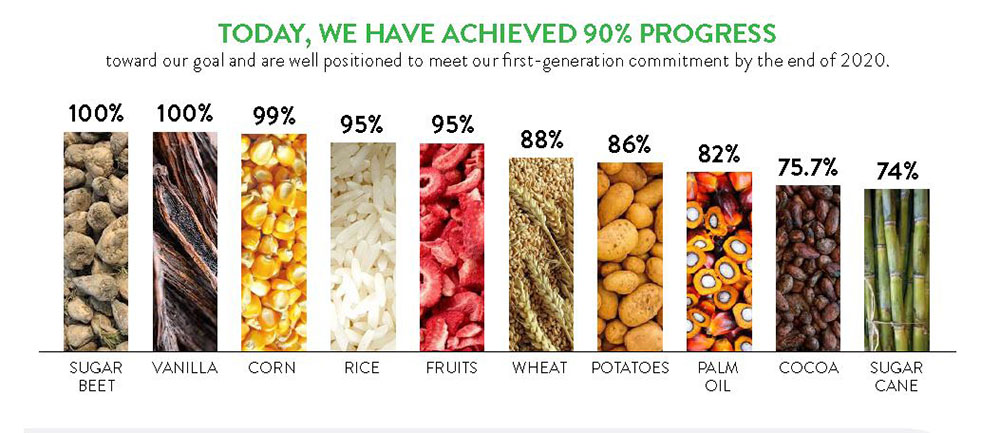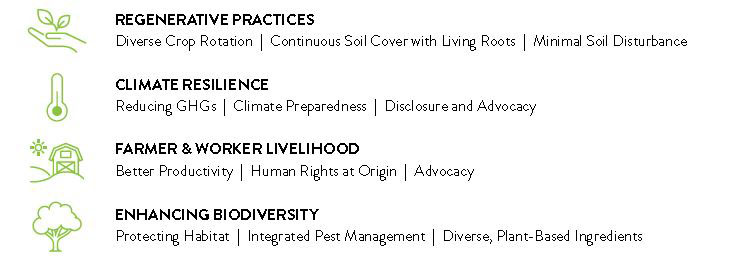Positions, Policies and Milestones

As a leading plant-based food company, achieving food security is at the heart of our commitment to society. Food security is intertwined with other major challenges, including the impact of climate change, the dilemma of food waste, and the depletion of our natural resources. Improving food security means we must understand its root causes and work holistically to address them in our ingredient supply chains through nature-based and other solutions, including boosting soil health, protecting biodiversity, halting deforestation and mitigating greenhouse gases.
This is why Kellogg has committed to create resilient, responsible supply chains, including for our priority ingredients. Following is the progress we have made toward our goal to responsibly source our 10 first-generation priority ingredients – including corn, wheat, rice, potatoes, sugar beet, sugar cane, fruits, palm oil, vanilla and cocoa – by the end of 2020. As of 2019, we have made 90% progress overall toward this goal.

How we responsibly source
To meet the global needs of our consumers, we partner with suppliers, manufacturers, contractors, joint venture partners, agents, distributors, and consultants. Each is a supplier to our company, and we hold all our suppliers to the same high standards of business integrity to which we hold ourselves. For details, please see our Global Supplier Code of Conduct.
In addition, we partner with suppliers of our priority ingredients to drive transparency in our supply chains and advocate for continuous improvement towards achieving our goal. Each year, we collaborate with suppliers and farmers to collect information with industry-standard tools such as the Fieldprint® Platform, Cool Farm Tool, and SAI Farm Sustainability Assessment, as well as our own Kellogg Grower Survey, which helps Kellogg demonstrate best agricultural practices and identify opportunities for improvement.
As part of our Kellogg’s Better Days global purpose platform, we’ve also committed to supporting 1 million farmers and workers, especially women and smallholders, by the end of 2030, through programs focused on climate, social and financial resiliency. Through our Kellogg’s Origins™ program, we have directly invested in over 40 sustainable agriculture projects in sourcing regions for our priority ingredients. Since 2015, we’ve reached more than 433,000 farmers. Together with our suppliers, NGOs, and research institutions, we assess improvement opportunities; provide training, technical assistance and cost-share for farmers to adopt improved practices; and to share best practices. Our global Origins programs focus on climate, biodiversity, and farmer livelihoods, while tailoring approaches to meet local needs and growing conditions. Agricultural practices that regenerate soil health, promote crop diversity, support species and habitat, and reduce greenhouse gas emissions are key tools in these programs.
BUILDING RESPONSIBLE AND RESILIENT SUPPLY CHAINS
OUR APPROACH

Smallholder Farmers and Women Impact Assessment
Kellogg recognizes that smallholder farmers play a critical role in global food supply, first for themselves and their families, but increasingly for broader food security opportunities in rural or impoverished communities. Kellogg recognizes the key role smallholder farmers play in food security in their communities and is assessing how our supply chain can improve productivity and livelihoods. As of 2019, our Origins programs have provided direct support to 32,605 smallholder farmers.
We also recognize that women play a significant role in agriculture, but in some countries still face challenges of injustice and inequality. In 2015, Kellogg partnered with TechnoServe to identify the parts of our supply chain with the highest prevalence of women, while assessing the risks and opportunities they face, depending on their communities, regions, and access to resources to improve their livelihoods. We continue to develop programs that support equity for women in our sourcing regions, building on this assessment. As of 2019, we have directly reached 13,270 women farmers, working with partners to empower them through direct participation in climate-smart agriculture and business training in cocoa, vanilla, and other sourcing regions.
To learn more about Kellogg’s Smallholder Farmers and Women Impact Assessment with TechnoServe, which continues to guide our Origins work, click here.

Kellogg Moves to Responsibly Sourced Corn for Kellogg’s Corn Flakes®, Frosties®, and Crunchy Nut® sold in Europe
Corn Supply Chain Audited to Ensure it Meets Responsible Sourcing Criteria
In 2018, we worked with DACSA, our regional corn supplier in Europe, and farmers in Argentina to move to using responsibly sourced corn for all Kellogg's Corn Flakes® sold in Europe. This means that it's produced with corn grown and harvested in accordance with environmental and social best practices, verified by an independent, third-party auditor. We shared this news in 2019, with the message ‘Responsibly Sourced Corn’ appearing on the front of all Kellogg's Corn Flakes® cereal sold in stores across the region. We also shared the Kellogg’s Responsibly Sourced Verification Protocol and Guidance and Group Verification Methodology we developed, modelled on those used by well-recognized, international nongovernmental industry groups, to determine that the corn was sourced responsibly. We expanded this program in 2019 to responsibly source corn for more brands in Europe. To learn more about our 2019 Responsibly Sourced corn verification, review the report here.
To learn more about our progress, please see our Responsible Sourcing Annual Milestones Reporting Year 2019. Please see our 2018 Sustainable Palm Milestones Report for more information about our progress on palm oil.

